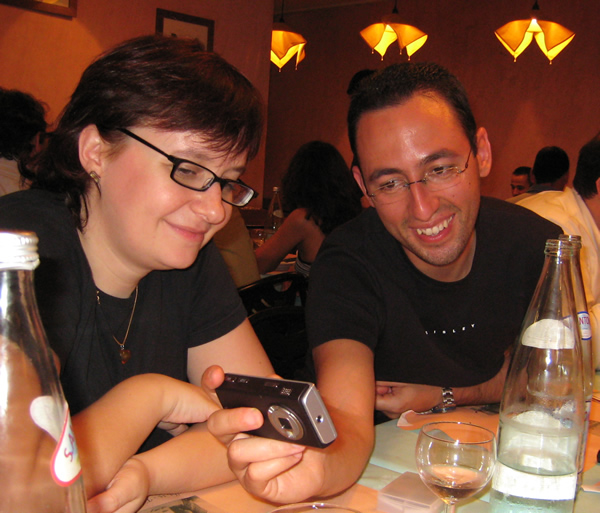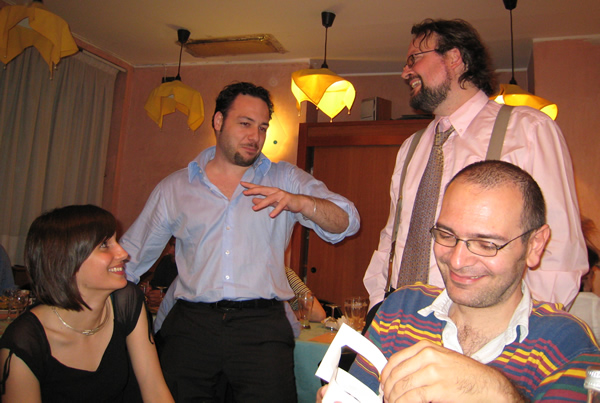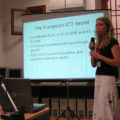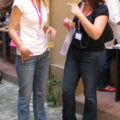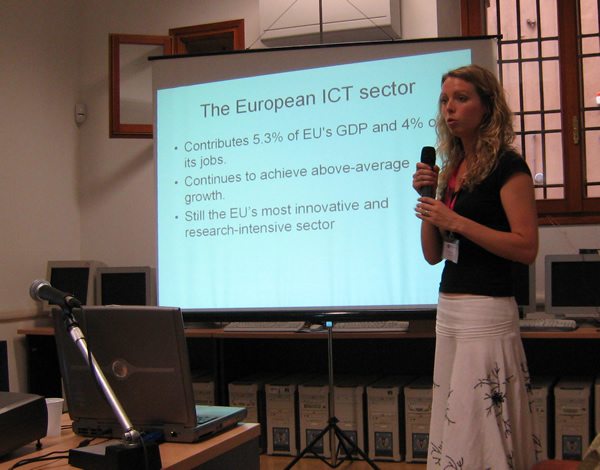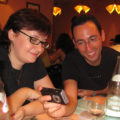|
|||||||||||||||||||||||||||||||||||||||||||||||||||||||||||||||||||||||||||||||||||||||||||||||||||||||||||||||||||||||||||||||||||||||||||||||||||||||
Tag Archives: Italian culture
Pandecena Milano June ’07 – In Which a Cunning Plot is Hatched
Famed Italian blogger Luca Conti (pictured at top right, showing off his Nokia to Sara Piperita) has pulled off what many bloggers dream of (and quite a few actually do, in other parts of the world): making a living by blogging. Or, at least, managing to get paid for various kinds of consulting (as a result of his blogging) while also running around the country blogging various interesting events he now gets invited to, plus other perks like fancy cellphones. The Italian PR world has figured out that bloggers are influential, and is courting them assiduously – or at least a small fraction of them. I am jealous that Luca’s job now includes boat trips on the Amalfi coast but, hey, it couldn’t happen to a nicer guy. (And I’ve got nothing to complain about: my own professional life is shaping up interestingly lately…)
Whenever Luca comes to town there’s a dinner (Pandecena), and these are excellent occasions for social and professional networking (aka lots of conversation with people I enjoy). This dinner was particularly well-populated because it had been scheduled for the night between the two days of a conference called Web 2.0 Oltre (Web 2.0 – Beyond) being held in Milan at which many of the “usual suspects” of the Italian blogosphere were panelists, speakers, etc. No one in the room had actually paid to attend the conference, for the excellent reason that it cost 1600 euros to do so!
I’ve been using Twitter lately (not today – stuck til I get my password fixed), which breeds an odd sense of familiarity with people I’ve barely met, and, having seen something day-to-day of how their minds work, it’s fun to then spend some face time. One such person at this event was Marco Formento, but the photos I got of him were scary…
I also enjoyed meeting Madga of Spotanatomy, a fun and insightful blog about advertising that has been referenced on this site before.
^ A woman I didn’t meet, Emanuele Quintarelli, David Orban, and Marco Palazzo of DueSpaghi, an Italian social network about restaurants. The structure of the site is due to be translated soon, but that doesn’t help with the meat of the matter, the actual reviews. Translation is a thorny problem for websites. It’s so hard (and expensive) to do it well.
^ Marco had fun with some PR stickers.
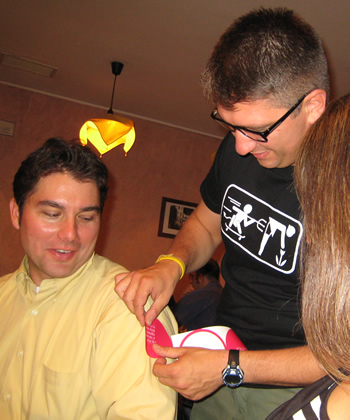
^ Thomas Christel, a Chicagoan now living in San Benedetto del Tronto, gets tagged by Lele. How one earth did he end up in San Benedetto, you may ask? (And I did.) The usual story: married into it. But he’s managed to keep a high-tech career going, in addition to running a B&B: Thomas is an executive for Yoo+, an online project management application now in beta testing.
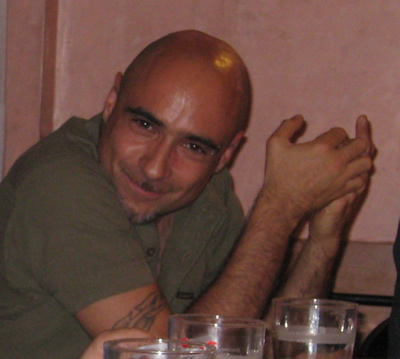
^ I can never resist taking pictures of Fabrizio (Biccio) Ulisse – he’s so damned cute!
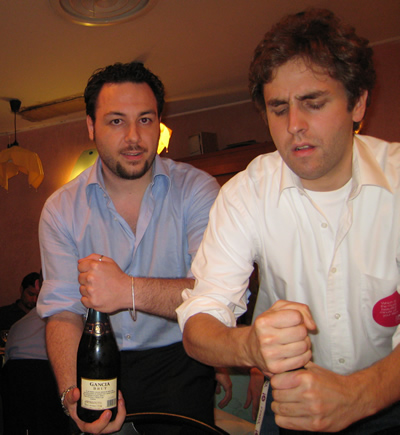
^ Emanuele and Luca Mascaro manhandling the spumante, courteously supplied by Reed Business.
I did have a bone to pick with Emanuele. He was (one of? chief?) organizer of the Web 2.0 Oltre conference, which somehow did not manage to feature EVEN ONE WOMAN speaker in two days of talks and panels. I had noticed (and been irritated by) this lack on the Web 2.0 Oltre site months ago, but didn’t know then who was responsible.
later – Emanuele tells me there were three women on the stage: Daniela Cerrato (who was in the original program and I must have overlooked her – my bad), Anna Masera (who was added after I saw the program), and a manager from Renault who spoke about that company’s recent push into Second Life.
I had had a battibecco* with Emanuele a few months ago in his own blog comments about the Italian Web 2.0 boys’ club he (and others) organized. He now came over to ask whether I was happy with the presenza femminile at this dinner.
I counted. Maybe ten women out of 40 people. Not great.
“Is that our fault?” he and David Orban asked.
No, not directly, obviously – anyone who wished could join this dinner. But the women aren’t coming to these events, and we need to figure out why. For starters, about that conference of yours…
Emanuele said something about not knowing any women who could have spoken.
“I’ve been online for 25 years,” I said. “And am now a Senior Web Producer for Sun Microsystems.” At which point he asked for my card.
I probably came off as bitter and aggressive in this exchange – a woman making her points strongly always risks being labelled a bitch. So be it.
I don’t believe that Emanuele (or Lele, who also recently had a restricted-invitation event to organize, and somehow ended up with very few women) is a chauvinist (or, as Italians would say, anti-feminist). But there’s a dangerous mindset in which, when you’re drawing up a list of influencers and experts to consult, invite, etc., somehow the people who come to your mind are all male. Women aren’t consciously excluded from your thinking, but… they don’t end up on your list either, do they? And that perpetuates a vicious cycle in which men are publicly identified as the experts, and women remain on the margins, waiting to be invited to the dance.
Well, I went to a school where anybody who wanted to, got out on the dance floor and danced – both literally and metaphorically. And I am by now too old and wise and bitchy to play the wallflower.
So, ladies, it’s time to do something about it. In October I will be hosting Web Women Weekend, at my home in Lecco. It will be an opportunity for girl geeks / technedonne / web women to get together, have fun, and figure out how we can support each other. (Invitation only, so, if you’re a woman in technology in Italy, let me hear from you.)

And that will be something to celebrate.

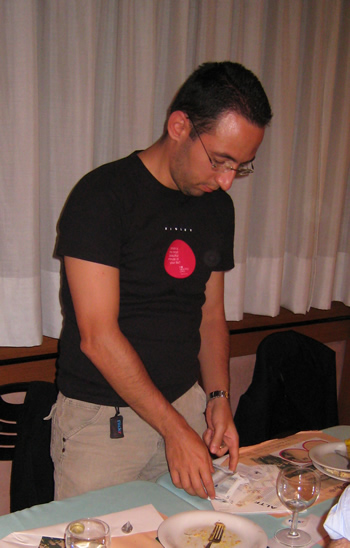
^ Coda: I took this picture just so we could start a nasty rumor that Luca only organizes these dinners because he makes money on them.
; ) – just kidding!
* battibecco – “a clash of beaks” – umm… birdfight?
What do you think? how do we get more visibility for women in technology in Italy?
Everyday Italian: Newspaper Headlines 9
upper left: The hospital has waste 8 million [euros] and meanwhile cuts more beds – “I saw again in Lecco the gypsy women who wanted to kidnap my daughter.”
lower left: Tragedy: Drowns in the sea the wife of Luigi Belmonte – All the school results, one first-year in three is flunked
lower center: [Driver’s] license points: the city government [is] forgetful – Lungolago [lakeside road]: motorcycles [being] stolen – city govrnment changes delegates [? political term I’m not sure of]
lower center 2: Hospital: Millions in damage for services – Usury: the chancellor speaks – Lecco [football team] has a new coach [In Italy, soccer coaches are called “Mister”. Tim Parks theorizes that this is because the first ones in Italy came from English.]
lower right: The defense of the Colombo [family]: “We are not loan sharks.” – Stadium, white smoke the Lecco [team] signs up for the C1 [league – the local football team has won a place in a higher league, necessitating a hasty upgrade of the stadium to bring it up to safety standards for the expected larger and more illustrious crowds. The white smoke refers to the tradition of sending up a puff of white smoke from the Vatican when a new pope has been chosen.]
Why Send My Child to Woodstock School?
Someone who has never attended Woodstock School may legitimately wonder why anyone would wish to send their child there.
I went to Woodstock in 1977 because I had no better educational choice (except to continue with correspondence school in Bangladesh, where my parents were living and working – a year of which had already been more than enough). “No other choice” was the case for many Woodstock students in those days, when jobs in development, missions, or international business were more likely to send Westerners overseas, and there were fewer international schools in odd places around the world for their kids to attend.
Woodstock nowadays is one of Asia’s elite schools, preparing students for still-much-desired admission to universities in the US and UK (as well as Asia’s own top universities). But it’s not so obvious why any student should come from outside of Asia. And there are plenty of reasons not to. Let’s look at some of those first.
(Some of) The Reasons Against
It’s Boarding School
Woodstock is a boarding school, a concept foreign to American and most European culture: if you love your child, how can you bear to send him/her away? In Italy, boarding school is widely considered something that parents do with children whom they cannot control at home, and/or it’s thought to show a lack of proper parental feeling. (Although we have several Italian friends who went to boarding schools in Italy and elsewhere and loved it: the negative attitude seems to come from Italians who have no actual experience of boarding.)
It’s in India!
Secondly, Woodstock is in India, specifically in the small town of Mussoorie, 7000 feet up in the foothills of the Himalayas. A location which, much as I love it, is what the foreign service used to call a “hardship post”. It’s cold and wet during the monsoon, cold and sometimes snowy during the winter (though fall and spring are gorgeous and not too hot).
School facilities and infrastructure are enormously, unrecognizably improved since I attended 25 years ago, but most of the buildings are still old and unheated, many cannot be reached except on foot, and the overall level of comfort is well below what we in “the West” are accustomed to.
Physical discomforts are bearable, perhaps even character-building, but there are worse potential dangers. Health is a concern: it’s a lot easier to get catastrophically sick in India, and a near-certainty that at least some “Delhi belly” will befall any traveller there (although, during our 2005 trip to India, I got sick and Ross did not. My own fault – I should not have had that lassi in Jaipur…)
On the other hand, India has very good health care these days – so good that people are travelling from the US, Canada, and UK to have non-urgent surgery and other treatment far more cheaply in Indian hospitals than they could at home (“medical tourism” they call it, and it’s a booming business).
…and there are plenty more aspects of India that the average Western parent inexperienced with Asia will find frightening, bizarre, and incomprehensible. But let’s not dwell on them for the moment.
The Reasons For
It’s a Nurturing Environment
At a Woodstock reunion long ago I talked with an older alumnus whose own children were then college age.
“How come your kids never went to Woodstock?” I asked him.
He explained that his daughter had done very well at home in Canada, was well-adjusted, made good grades, had lots of friends, etc. He had never even considered sending her to Woodstock, because there was no reason to take her out of her happy situation.
His son, on the other hand, had had both social and academic problems at school, and didn’t seem to be going anywhere with his life after high school. The alumnus thought his son might well have benefited from Woodstock, as a total change of scene if nothing else, but his wife would not hear of it: the idea of sending her son off to school in India was just too strange and scary. The alum regretted that they hadn’t tried it.
I’ve spoken with many alumni who feel that they benefitted enormously from Woodstock, even if they were there only a year or a semester. One of my own classmates came for her senior year, having done all the rest of her schooling in a standard US high school, where she was considered something of a weirdo. She credits Woodstock with making her feel that she was fine just the way she was, giving a huge boost to her self-confidence. (Years later, my own daughter said the same.)
For me, Woodstock had a tremendously positive impact on my life, as I have written before: “The four years I spent there nurtured me, gave me self-confidence, and helped to heal the wounds of my parents’ divorce and other upheavals. Years later, my therapist told me that if I hadn’t gone to Woodstock, I would probably have ended up ‘gibbering in a corner somewhere.'”
Do you have to be among the walking (psychologically) wounded for Woodstock to do you good? Of course not. Plenty of healthy, well-adjusted kids have gone there and enjoyed it. The Woodstock environment is nourishing and nurturing for just about everyone. How and why it is this way is a topic for a much longer article!
It’s in India!
At a reunion in London in 2003, I met the parents of a German boy who had just gone to Woodstock for his junior year abroad. The parents had travelled to London to meet alumni because they knew very little about the school or the people it produced. How on earth did their son end up there?
He had been doing well in school in Germany, but was not satisfied with the level of English he was learning. (I assume that his father, an international businessman, had drilled into him how important it is in today’s global world to speak good English.) So the boy wanted to go to a school where he could study in English, but exchange programs in the US or Canada did not appeal to him (possibly for the same reason – no choice of the actual school – that similar exchange programs from Italy did not appeal to Rossella).
His father, whose business took him frequently to China, suggested that he look for a school in Asia: “Asia is the future,” he told his son.
The boy did a search online, and came up with Woodstock. His father stopped by for half a day on one of his China trips, approved of what he saw, and off the boy went. I believe he stayed there a second year as well, and graduated with his class.
Unusual? Certainly. Weird? Maybe. But the father had a point. The Economist recently stated that “India may overtake Germany as the world’s fifth-biggest consumer market by 2025.” The future, indeed.
Indian culture is already felt throughout the world. In a recent episode of the American TV show Heroes, the Indian character used the word goondas without explaining it, clearly expecting both the character he was speaking to and the audience to understand it (the meaning was clear enough from the context: goondas are thugs – and thug is also originally an Indian word). Anyone who wishes to be successful in an increasingly globalized and Indianized world will certainly benefit from knowing India well! (China, too, but I don’t know of any Woodstock-like schools there. Maybe Woodstock should offer courses in Chinese language and culture.)
Enduring Friendships
Many alumni and former staff gathered in Mussoorie to celebrate Woodstock’s 150th anniversary in 2004, some bringing family. My classmate Deepu’s daughter said to her afterwards: “I see you with all your old friends and hear the great stories you tell. When I’m old, I want to have stories like that, too.” She has now been at Woodstock for several years herself, and presumably has her own friends, and stories to tell with them.
FemCamp Bologna 2007: Sessions & Reflections
In the afternoon I attended some sessions, though I missed the most popular presentation of the day, Iocelopiulunghismo (“Mine’s-the-biggest-ism”), by Elena and Feba, a funny and ironic look at (male) bloggers’ obsession with their (blog) statistics.
I poked my head into Andrea Beggi‘s unfortunately-titled presentation on “Blogging for Ladies,” but the room was so crowded I couldn’t stay. I hope and assume that he intended the title to be tongue-in-cheek, but it was risky, and evidently a number of people did not take it as ironic. After what was apparently a useful bunch of technical how-to’s on getting more traffic to one’s blog, he came in for some flak about “what makes you so sure women want more traffic to their blogs?”
If this comment was really made, it was more than a bit silly. There are indeed private blogs intended for specific, closed audiences (e.g. one’s family), and hopefully the people who write them are smart enough to make them accessible only to the desired readers. But anyone else who’s blogging probably does want to be found and read – if you blog and nobody reads you, have you truly blogged at all?
I attended a session on women in the open source community, basically a report of statistics which, while I had not heard them before, did not surprise me in the least. I knew instinctively that women are a small percentage of the people working on open source software (I can remember seeing only one on my particular beat – storage – in the OpenSolaris.org forums). The interesting question is: why are there so few? One possible answer (given) is that people tend to do open source work in their free time, which women have less of than men (this is not fair, but that’s a topic for another time).
Something was said about technologies designed by and for women, a concept that wasn’t clear to me. In that context, we certainly weren’t talking about recipe organizers. Marzia responded with an example, Cercatrice di Rete (“Web Searcher”, the word searcher being in the feminine in this case), which she explained in more detail the next day at the E-Wit conference. It’s a search engine tuned to highlight women’s issues, e.g. searching on violenza returns results related to violence against women.
I suppose it’s one more example of a vertical search engine. I may be missing the point but, if I wanted to research “violence against women”, wouldn’t I just type that in? And if I needed immediate resources to protect me against an abusive spouse (the example Marzia seemed to have in mind), I would probably search on something more to the point, like: “how to murder your husband and get away with it.”
When it was my turn to present, I was disappointed that few of the younger women I’d seen at the camp were in the room. I was aiming mostly at them in my talk Fuori dagli Schemi – Aneddoti e Lezioni di Una Carriera Insolita (“Outside the Box: Anecdotes and Lessons from an Unusual Career”). I was afraid that what I had to share would be obvious to career women closer to my own age (well, okay, in their 30s), who seemed to be the bulk of my audience.
But several friends were present to cheer me on, and everyone seemed enthusiastic in spite of my quavering delivery in unusually shaky Italian (a result of nerves plus jet lag). If you want to hear it, go to this page and look for my name (towards the bottom), and click video at the end of that line (actually, it doesn’t sound as shaky as I had feared, though the grammar is not perfect).
Afterwards one woman told me she had needed to hear my admonition to “make sure the people who count know about the work you’re doing”, because she, too, had suffered from accomplishments that went unnoticed.
There wasn’t time for discussion, unfortunately, so I missed the opportunity to raise the question of what next steps the group could take for us women to help each other in our professional IT careers. I do have some ideas, though, which I’ll be discussing shortly in these pages.
Lele then got up to introduce a group of “cheerleaders.” I was about to rip his head off – the idea that my “go get ’em girls” talk should be immediately followed by sexist, male-pleasing bullshit was just too much. Then I realized that he had been asked to introduce a presentation I’d been curious about, “Save the Cheerleader, Save the World,” on gender in the fan communities of Heroes. Lele had gotten the wrong end of the stick in introducing the three young women doing the presentation as cheerleaders – the cheerleader referred to is character Claire Bennett.
One of the three did a good job of presenting the research carried out by a (mixed gender) group of students at the University of Urbino, but we didn’t actually hear any conclusions: those will be presented in a video to be posted on YouTube. It’s a pity her two colleagues didn’t get to speak, and I wasn’t sure of any of their names as Lele made a joke of them. But I appreciated that they had stood in the audience and smiled at me through my own presentation – I hope they gained something from it (e.g., don’t let someone else do all the talking for you, even if she’s female). later – I know at least one of them did: she left a very nice comment.
Amanda then gave a well-researched presentation on women in IT in Europe. That ties in well with what I heard the next day at the E-Wit conference, so I will talk about it in that context, in a future article.
Organization
There’s been a lot of bitching about how hot and crowded the venue was. In fact there would have been a lovely and capacious alternative venue, the one used for E-Wit the next day, in quarters shared between the Women’s Library of Bologna and the University of Bologna’s Department of Visual Arts.
However, as Federica (one of the organizers) explained to me, Internet access there was so hemmed about with firewalls that it would have been impossible to stream the video which allowed people from all over Italy (and the world) to follow the event live. Many of us present had also attended RitaliaCamp, hosted at a branch of the University of Milan which turned out to be very grudging in allowing attendees network access, to everyone’s frustration. (Hyper-bloggers gasp like fish out of water if cut off from Internet access for more than 15 minutes.)
The organizers of FemCamp opted instead for via San Felice, and, thanks to a sponsor, were able to provide the best wireless coverage anybody has yet seen at a camp in Italy – lack of which would surely have been cause for complaint at the other venue (note to conference organizers: you can never please everybody).


